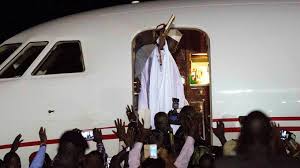Yahya Jammeh, The Gambia’s leader for 22 years, flew out of the country late on Saturday after declaring he would step down and hand power to newly elected President Adama Barrow, ending a political crisis.
After marathon talks with Guinea’s leader Alpha Conde and Mauritania’s Mohamed Ould Abdel Aziz, Jammeh accepted to peacefully give up his office to Barrow, who was waiting in neighbouring Senegal for the strongman to leave.
An AFP journalist at the airport at the capital Banjul saw Jammeh take off in an unmarked plane heading for an unspecified destination, seen off by a delegation of dignitaries and soldiers.
Jammeh dressed in his trademark white flowing robes, kissed a Koran before waving to a small crowd on the tarmac.
He was accompanied by Guinea’s President Alpha Conde who in the last 48 hours negotiated an exit plan for Jammeh whose details have yet to be made public.
Minutes before Jammeh’s plane took off, a Mauritanian jet which had been on standby for hours on the tarmac, left the airport.
Earlier Guinean state minister Kiridi Bangoura said: “Yahya Jammeh prefers, for the moment, to come to Guinea, to stay in Conakry, before he decides, along with the Guinean authorities, where to move for good.”
An official from the west African regional bloc ECOWAS — which backed a threat of military intervention before Jammeh yielded and announced he would step down — said “one or two villas” had been prepared for him in the Guinean capital.
The agreement that finally saw the strongman give in to pressure to step down “foresees the departure of Yahya Jammeh from The Gambia for an African country with guarantees for himself, his family and his relatives,” Abdel Aziz said on return to Nouakchott in remarks quoted by the official AMI news agency.
Activists will be keen to see Jammeh — who controlled certain sections of the security forces — refused amnesty for crimes committed during his tenure, which was rife with rights abuses.
Diplomats had also mentioned Morocco, Equatorial Guinea and Mauritania as possible places of exile for Jammeh.
– Cautious optimism –
Jammeh’s actions will be carefully monitored as he has previously agreed to step down after recognising Barrow as winner of the December 1 elections — before completely reversing his position.
“I have decided today in good conscience to relinquish the mantle of leadership of this great nation with infinite gratitude to all Gambians,” Jammeh said on state television early Saturday.
“My decision today was not dictated by anything else than the supreme interest of you, the Gambian people and our dear country,” he added.
After a calm night in Banjul, many only heard the news on waking, and greeted his declaration with a cautious optimism, aware of the leader’s mercurial nature.
“God has heard our prayers!” said Sheikh Sham, a 34-year-old metalworker from the suburb of Kanifing west of Banjul.
Mohamed Jallow, 16, said he was angry the president had allowed the political crisis to deteriorate to the point that tourists were forced into unplanned evacuations, potentially devastating an economy reliant on them for a huge chunk of its gross domestic product.
“I have never known another president. We are happy that he’s going but he had to spoil everything before he went,” he told AFP while gesturing at an empty beach.
Jammeh’s refusal to leave triggered a major political crisis, with the international community putting huge pressure on him and troops from five African nations gathering on The Gambia’s borders.
Army chief Ousman Badjie, a former Jammeh loyalist, had on Friday pledged allegiance to Barrow along with other top defence and security chiefs, a government source said.
Source :punch
